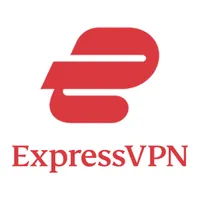ExpressVPN launches three new pricing tiers in a major shake up of its VPN plans
Three tiers are now available, Basic, Advanced, and Pro

Here at Tom’s Guide our expert editors are committed to bringing you the best news, reviews and guides to help you stay informed and ahead of the curve!
You are now subscribed
Your newsletter sign-up was successful
Want to add more newsletters?
Join the club
Get full access to premium articles, exclusive features and a growing list of member rewards.
Editor's note: In late 2025, ExpressVPN lowered its prices even further, with the cheapest plan dropping to $2.79 per month.
ExpressVPN has revamped its VPN offering and now has three tiers of plans to choose from.
The plans are: ExpressVPN Basic ($3.49 per month), ExpressVPN Advanced ($4.49 per month), and ExpressVPN Pro ($7.49 per month), and each tier unlocks new VPN features. All prices are for the two-year plan. For one-month and one-year plans, the up-front cost is less, but works out as more per month.
The provider is a regular in our best VPN list, but its expensive pricing has always been a significant drawback – at $4.99 per month, it was more expensive than all its competitors. However, the price of ExpressVPN Basic brings it closer to the likes of NordVPN and Proton VPN.
In its announcement, ExpressVPN said the internet and privacy needs have changed, and the company is "evolving to meet them."
ExpressVPN Basic | $3.49 per month
With the introduction of a new tiered system, ExpressVPN has become more affordable. ExpressVPN Basic offers protection for up to 10 devices, and continues to boast the speed, privacy, and security ExpressVPN is known for. The two year plan starts at $3.49 per month ($97.72 up front). It comes with four extra months of protection for free and a 30-day money-back guarantee.
ExpressVPN is evolving
ExpressVPN has offered a single subscription plan since its launch in 2009 and this change has been described as "one of the most significant changes in the company’s 16-year history."
The headline change is a price reduction. The cheapest ExpressVPN plan has now dropped from $4.99 per month to $3.49 per month.
This makes it cheaper than Proton VPN ($3.59 p/m) and only $0.40 per month more expensive than NordVPN Basic ($3.09 p/m).
It's still significantly more expensive than Surfshark ($1.99 p/m) and Private Internet Access ($2.19 p/m). But the key fact is ExpressVPN is no longer over $1 per month more expensive than its closest rivals.
Another big change is ExpressVPN will now protect a minimum of 10 devices on all plans. Previously only eight devices were protected on one plan – the fewest out of the VPN big hitters – so this is a positive change.
10 devices are protected with ExpressVPN Basic, 12 with ExpressVPN Advanced, and 14 with ExpressVPN Pro.
For comparison, Proton VPN and NordVPN both protect up to 10 devices on all plans, while Surfshark and Private Internet Access (PIA) offer unlimited device protection.
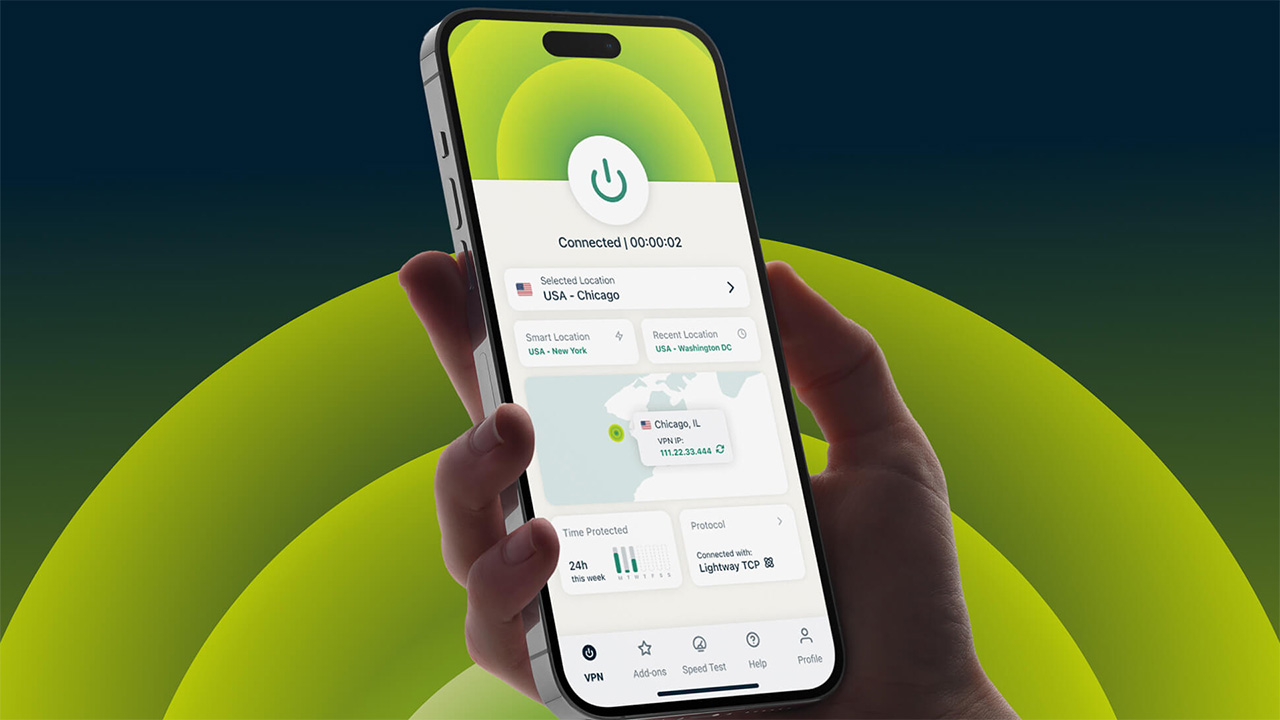
Comparing tiers
So, what do you get in each tier and does this compare with other VPN providers?
Apart from the increase in device protection, nothing has changed in terms of ExpressVPN's actual VPN – the number of devices protected and extra features offered are what varies between tiers.
All plans, in every tier, will benefit from one of the fastest VPNs we've tested, its secure RAM-only servers, VPN obfuscation, TrustedServer network and the Lightway and Lightway Turbo protocols.
Its audited no-logs policy remains unchanged, and all users will still be able to make use of ExpressVPN's 30-day money-back guarantee and 24/7 live chat support.
For every tier, one-month, one-year, and two-year plans are available. The one-year plans come with an additional three months of VPN protection. The two-year plans come with an extra four months. As always, each tier's two-year deal works out as the best value for money.
ExpressVPN said these tiers reflect the way people use its product. Some simply want a VPN, while others want a full privacy suite. The tiers and their pricing reflects that spread of need.
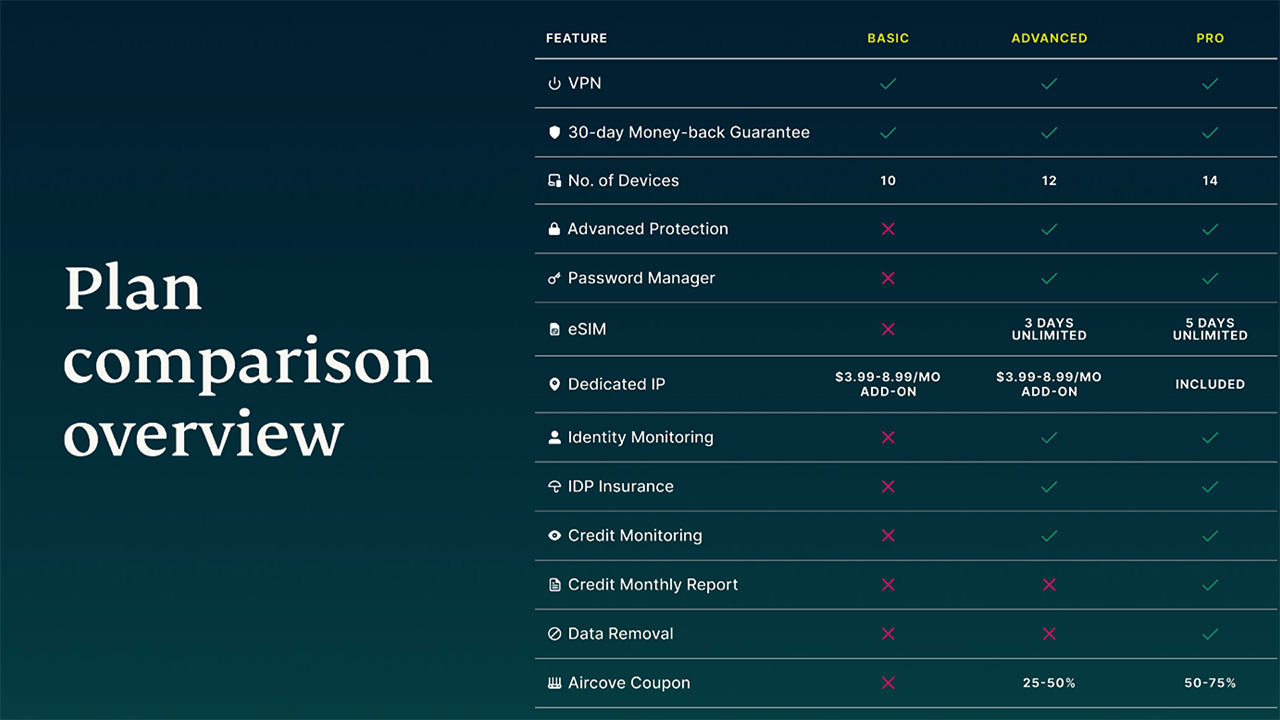
ExpressVPN Basic – $3.49 per month
ExpressVPN Basic is designed for those who just want a fast, safe, and secure VPN. You'll get access to all core VPN features and 10 device connections.
There's no thrills with this VPN plan and advanced protection features, along with the Keys password manager are no longer included. So if you're after a VPN with threat protection, ExpressVPN Basic isn't an ideal plan.
However, ExpressVPN has confirmed that DNS-based ad-blocking will be introduced to ExpressVPN Basic plans in the coming days.
Not a lot separates this plan from NordVPN Basic and Proton VPN. All protect up to 10 devices and don't grant you any extra features. Threat Protection is included in the NordVPN plan, however it's not the full blown Threat Protection Pro.
ProtonVPN includes its full NetShield threat protection offering but we found this doesn't perform as well as other VPN threat protections – however unlike NordVPN and ExpressVPN, it's at least a full threat protection feature.
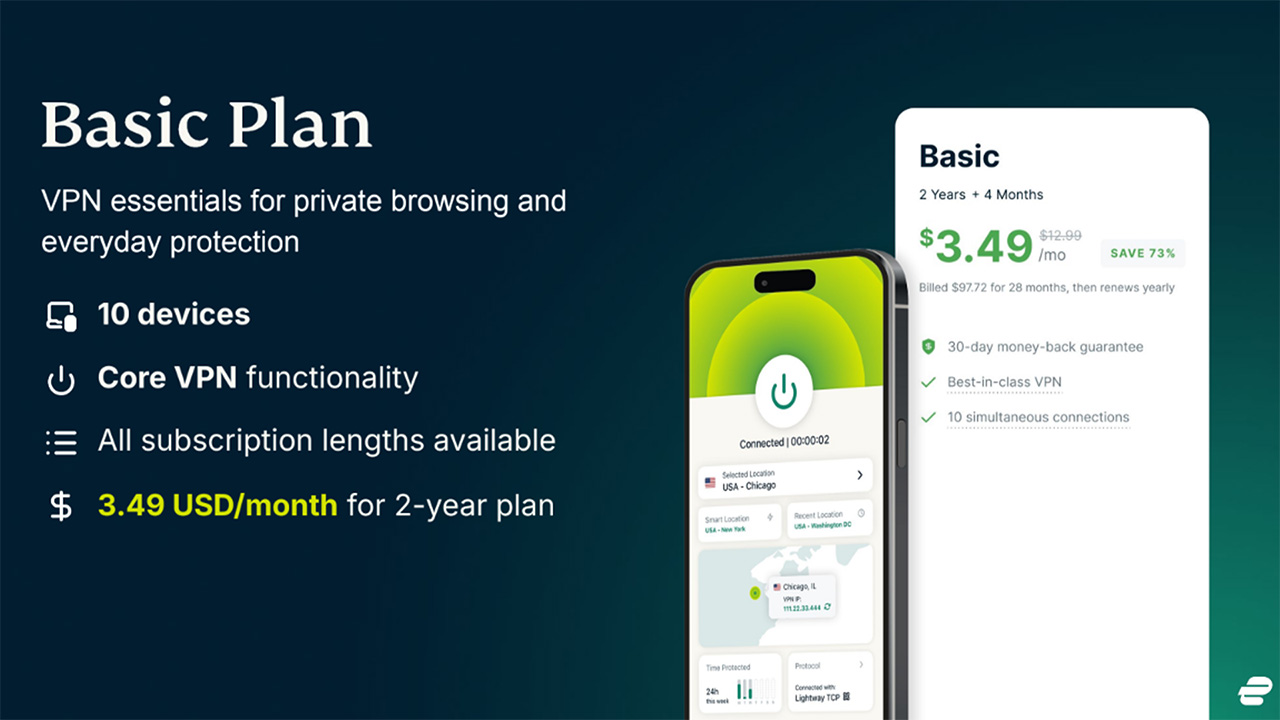
ExpressVPN Advanced – $4.49 per month
ExpressVPN Advanced is similar to the previous standard ExpressVPN plan. It includes all core VPN features, but can protect up to 12 devices.
The Keys password manager is included, along with Advanced Protection – including threat manager, ad & tracker blocker, and parental controls.
US users will receive part of ExpressVPN's Identity Defender suite. There's ID monitoring an credit monitoring, as well as up to $1 million in ID theft insurance.
There's also three days of unlimited holiday.com eSIM data and Aircove router discounts of up to 50% – the Aircove router makes ExpressVPN the best router VPN out there.
This plan offers more extra features than Proton VPN and can be compared to NordVPN Plus ($3.99 p/m). NordVPN Plus is a little cheaper but a majority of NordVPN's identity protection features are only available with NordVPN Prime ($6.99 p/m).
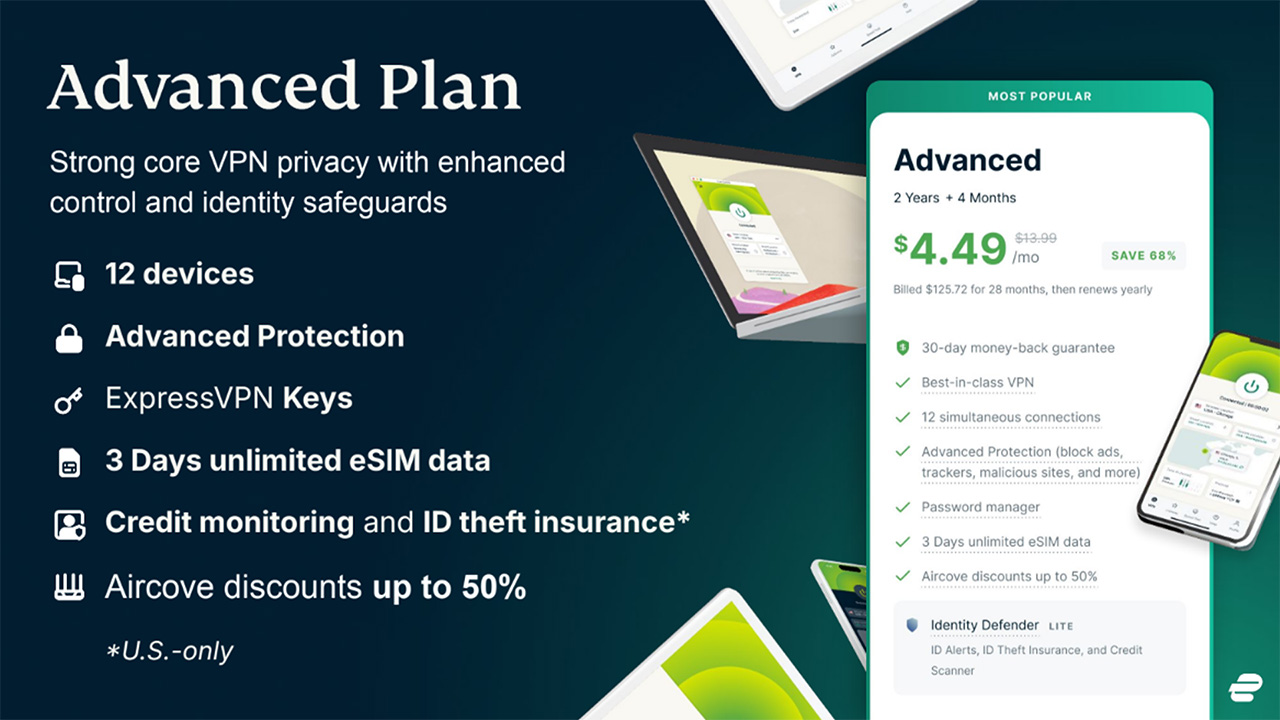
ExpressVPN Pro – $7.49 per month
This top-tier package is aimed at ExpressVPN users who desire a full cybersecurity suite and this is where the improvements begin to slow down.
It includes everything offered in the previous tiers and upgrades US users to the full Identity Defender package. This adds monthly credit reports and data removal services.
You can protect up to 14 devices, benefit from five days of unlimited eSIM data, and will get up to 75% of Aircove routers.
The big inclusion here is Dedicated IP and ExpressVPN has said it is a highly requested feature. This is a unique IP address only you use and it's tied to a specific location. Regular VPN IP addresses are shared between users which may lead to increased CAPTCHAs.
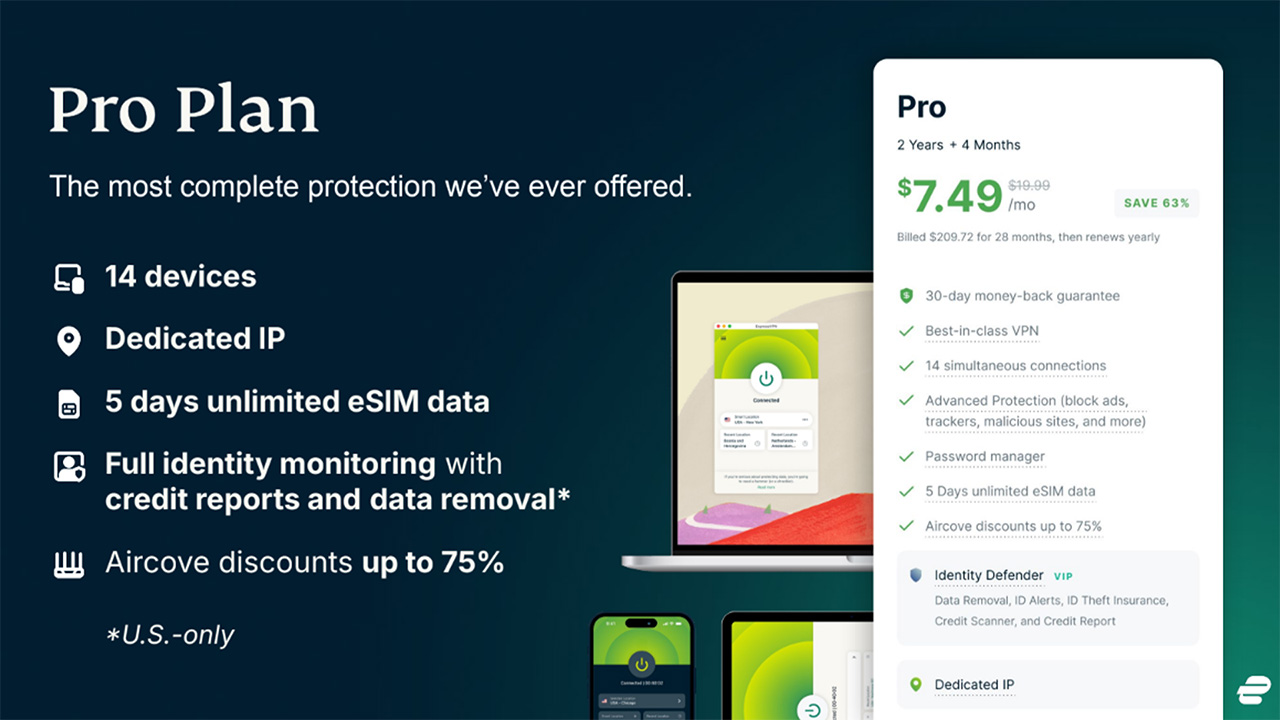
Dedicated IP is a $3.99 per month optional extra for the other two-year ExpressVPN plans. If you know you want the feature, then ExpressVPN Pro is a good deal. This plan is $7.49 per month and if you were to take out the original VPN plan and add dedicated IP, it would cost at least $8.98 per month.
Neither NordVPN or Surfshark include dedicated IP in any plan. NordVPN's dedicated IP is $3.69 per month and Surfshark's is $3.75 per month. PIA's is $2.50 per month and Proton VPN doesn't offer dedicated IP to personal VPN users.
Therefore, the value of this plan rests on whether you want dedicated IP or not – and whether you live in the US.
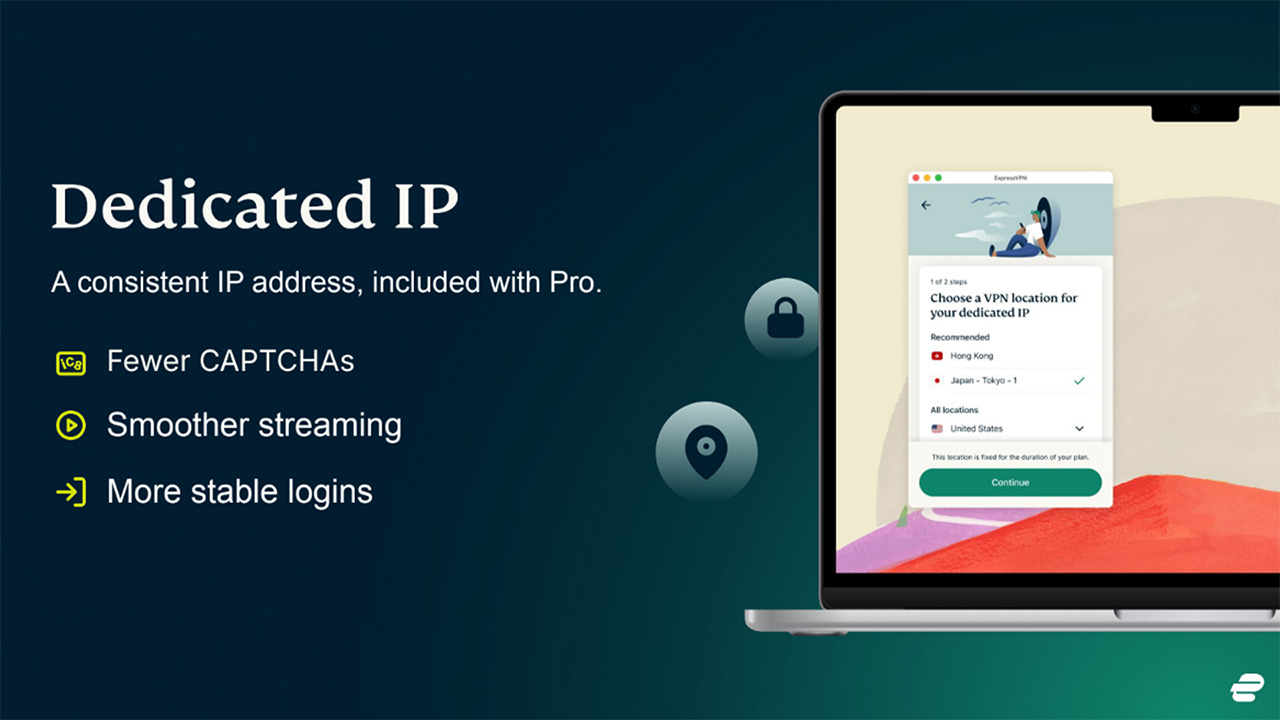
Are the new tiers worth it?
The answer to this question depends on what features you use and desire.
If you're just after a good VPN then yes. You increase your device protection limit by two and by subscribing to ExpressVPN Basic, your plan is $1.50 per month cheaper.
For most people, ExpressVPN Basic is a nice deal and makes the provider far more affordable.
If you're a fan of the Keys password manager but don't use much else, then it's probably good value. Subscribing to the ExpressVPN Advanced plan will save you $0.50 per month, allow you to keep Keys, and you'll gain VPN protection for an extra four devices.
You'll keep your advanced protection features but lose some of Identity Defender. If you're not in the US, then this won't matter. If you're in the US, whether this is a loss or not depends on if you use the features.

ExpressVPN Pro is a little more complicated. Due to Identity Defender being a US-exclusive, most of the world won't benefit from some of the features offered. On top of that, if you don't want dedicated IP there's no reason to buy the plan.
With the old ExpressVPN plan, the full identity defender suite was included. The new tiers split this feature offering and if you want the full package you have to pay $7.49 per month, up from $4.99 per month.
If you don't want dedicated IP, this is a $2.50 per month increase and your only additional VPN benefit is protection for an additional six devices – a very costly increase.
If you want dedicated IP, it's a good deal. If you want dedicated IP and you use Identity Defender, ExpressVPN Pro is a great deal.
eSIM data and additional free months were included in old plans but it does look like you get more data with these plans.
Will you get downgraded?
No. ExpressVPN has confirmed all users subscribed to legacy plans will see no change to their features. No user will be downgraded and you'll continue to be able to use ExpressVPN as normal until your plan expires or you cancel it.
Only when you re-subscribe will you see a change in the plans, prices, and features offered.
Will more VPNs introduce a tier system?
Tiered plans are still in the minority when we compare the major providers. But ExpressVPN has made the jump and is the latest provider to split its VPN offering.
NordVPN, arguably the biggest name in the industry, has offered tiers for a while. Three or four plans are available in varying regions across the world and you can compare what's on offer where you are with our NordVPN prices and plans page.
Surfshark, which is owned by NordVPN's parent company Nord Security, also has tiered plans. It has Surfshark Starter, Surfshark One, and Surfshark One+ and these range from $1.99 per month to $3.99 per month.
IPVanish can also be considered as offering tiers. It has two plans – IPVanish Essential, at $2.19 per month, and IPVanish Advanced, at $3.29 per month.
However, a majority of providers offer one VPN plan, with the only difference being whether you take out a one-month, one-year, or two-year plan. As mentioned above, two-year plans are always the best value in the long run.
Proton VPN, PIA, CyberGhost, Mullvad, and Windscribe are some of the providers who have one tier of VPN plan.
We test and review VPN services in the context of legal recreational uses. For example: 1. Accessing a service from another country (subject to the terms and conditions of that service). 2. Protecting your online security and strengthening your online privacy when abroad. We do not support or condone the illegal or malicious use of VPN services. Consuming pirated content that is paid-for is neither endorsed nor approved by Future Publishing.

George is a Staff Writer at Tom's Guide, covering VPN, privacy, and cybersecurity news. He is especially interested in digital rights and censorship, and its interplay with politics. Outside of work, George is passionate about music, Star Wars, and Karate.
You must confirm your public display name before commenting
Please logout and then login again, you will then be prompted to enter your display name.
 Club Benefits
Club Benefits










